From only numbers
Quantity words in English are one of the most common parts of grammar. But it also causes many difficulties for learners because of the variety of words and structures. Quantity words in English are not simply "many" or "few", they are divided into many levels. To avoid mistakes that lead to unfortunate loss of points, below EnglishTopVN will bring useful knowledge to you!
1. Concepts
From only numbers is a word that indicates the quantity of an object or something and can replace determiners. Some of these types of words go with countable nouns, some go with uncountable nouns, and some can go with both countable and uncountable nouns specifically:
-
Quantity words with countable nouns: many, a large number of, few, a few, a larger number of, hundreds of, thousands of, a couple of, several
-
Quantity words with uncountable nouns: much, a great deal of, little, a little, a large amount of
-
Quantity words go with countable and uncountable nouns: some, any, most, of, no,plenty,of, a lot of, heaps of, lots of, all, none of, tons of
2. Quantity words
There are many quantity words in English, the number of quantity words in English is greater than 10. Therefore, you need to arrange the words logically to make it easy to remember and apply in real English communication every day. day.
Save idea: The preposition of is often accompanied by (a) few, (a) little when it precedes articles (a/an, the), demonstrative pronouns (this/that), possessive adjectives (my, his, their) or object pronouns (him, her, us).
For example:
- Pour a little of the milk into that bowl.
2.1. (A) few/ (A) litte
– Few and A few often comes before plural countable nouns, for example: few trees, a few trees.
+ Few has an almost negative, negative meaning.
For example:
- I don't want to go there because I have few friends.
+ A few is equivalent to some which means a small amount, a few, a number and can be used in affirmative sentences.
For example:
- You can see quite a few houses on the hill.
Note: You can also use only a few to emphasize quantity, but it has a negative meaning.
For example:
- The village was very small. There were only a few houses there.

– Little and A little usually comes before uncountable nouns.
+ Little means very little, not as much as expected.
For example:
- We had little rain in summer.
+ A little means a small amount and is used in affirmative sentences.
For example:
- It causes a little confusion.
Note:
+ Little is also used as an adjective with the meaning of small and cute.
For example:
- Amanda is just a little girl.
+ Only can be added before a little to emphasize quantity, but has a negative meaning.
For example:
- Hurry up! We've got only a little time to prepare.
2.2. Some and Any
– Some: often goes with countable nouns meaning 'a few', goes with nouns uncountable means 'a few'. Some How to use Some commonly encountered in English such as:
For example:
-
He saw some strangers in his house.
-
I want some milk.
+ After some can be a singular countable noun, used to refer to a specific person or thing that is unknown.
For example:
- Some student hide my bags.
+ Some is used in affirmative sentences, in questions and suggestions.
For example:
- Would you like some more coffee?
+ Some goes with a number to express an unexpectedly high number
For example:
- Some $60 million was needed to conduct this project.
+ The preposition of is accompanied by some when it comes before articles (a/an, the), demonstrative pronouns (this/that), possessive adjectives (my, his, their) or personal pronouns. language (him, her, us). Use some of when referring to a part of a whole.
For example:
- Some of my friends were late to school yesterday.
Note: Do not use some when used for units of time.
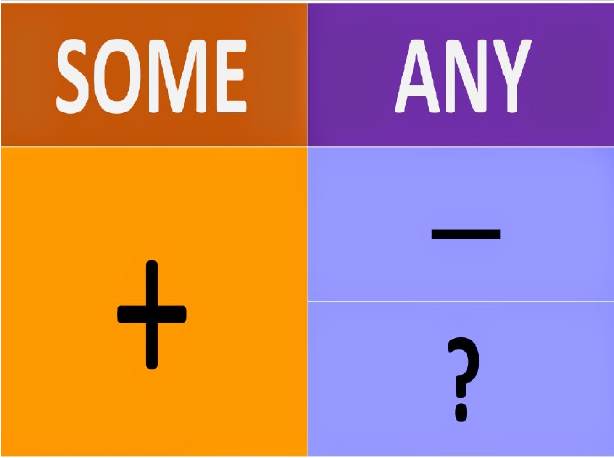
– Any: means a certain person/thing (in a question), not at all, no one (negative meaning), anyone/anything (affirmative meaning). Depending on the semantics and context of the sentence, any has different meanings. Any is used when referring to an unspecified/unknown quantity. You should pay attention to distinguishing between the appropriate use of any and some depending on whether the accompanying noun is a countable or uncountable English noun.
For example:
- She didn't know any boys in her class.
+ In negative sentences and interrogative sentences, any is followed by a plural noun or an uncountable noun.
For example:
- There aren't any yellow cars here.
+ In affirmative sentences, any goes with singular, plural, uncountable, countable nouns with the meaning 'anyone/anything/thing'.
For example:
- Call this hotline if you have any questions about the show.
+ Any can be used with hardly, or after if and negative words.
For example:
- He speaks hardly any French.
+ The preposition of is followed by any when it comes before an article (a/an, the), a demonstrative pronoun (this/that), a possessive adjective (my, his, their) or an object pronoun (him, her, us).
For example:
- I couldn't finish any of these homework.
2.3. A large number of, A great number of, Plenty of, A lot of, Lots of
A large number of, a great number of, plenty of, a lot of, lots of,…: all of these words mean “many”. They can be used to replace many and much in affirmative sentences with a formal meaning.
Pay special attention to distinguishing between two easily confused phrases: "the number of" and "a number of”. Although it also has the meaning of indicating the quantity of an object, the phrase “the number of + N” is often used to indicate a general quantity or total amount, so it is often used for singular noun phrases so the accompanying verb is also singular. .
For example:
- The number of workers we need to hire is there.
Meanwhile, the phrase “a number of + N” has the meaning of “a number” + N… so it is often combined with nouns to form a plural noun phrase and the accompanying verb will be pluralized.
For example:
- A number of cars are on all the streets during rush hour in Hanoi city.
+ Special a lot of and lots of is used for both countable and uncountable nouns. However, lost of used in a less formal style a lot of.
+ Verbs in sentences are divided according to the subject/noun behind them of.
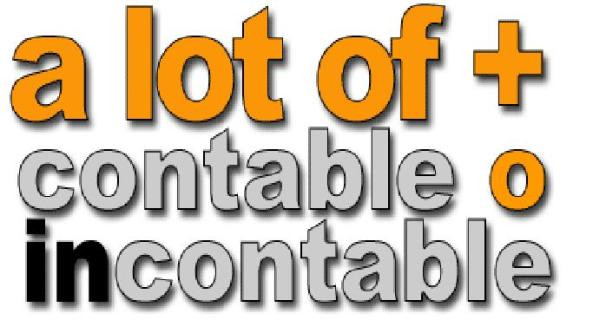
2.4. Most
Mentioned quantifiers in English can not ignore the word most.
- Structure: most + noun makes most sense, for the most part
For example:
- Most people are afraid of snakes.
– Most + plural noun: verb conjugated in plural.
– Most + singular noun: verb conjugated in singular.
– Most of is also one of them Quantity words in English, it is another conversion from most.
+ Most comes with the preposition of when it precedes an article (a/an, the), demonstrative pronoun (this/that), possessive adjective (my, his, their) or object personal pronoun (him , her, us).
For example:
- Most of these students are intelligent. (Most students are smart)
+ Most of + plural noun: plural verb.
+ Most of + singular noun: verb in singular
+ Most of Also used before geographical names.
For example:
- Most of England, most of Viet Nam
Note: most + Noun is used when speaking in general and most of the + Noun is used to mention a specific thing.
For example:
-
Most cakes are sweet.
- Most of the cakes at this festival are sponsored by Kinh Do.
2.5. Much and Many
This is one of them Quantity words in English most familiar and well-known. In particular, the preposition of is accompanied by much and many when it precedes articles (a/an, the), demonstrative pronouns (this/that), possessive adjectives (my, his, their) or pronouns. object pronouns (him, her, us).
For example:
-
Not many of them passed the final exam.
-
How much of this article is true?
– Many with the meaning of many, many is often used:
+ With countable plural nouns.
For example:
- Many people came to the meeting.
+ Mainly in negative and interrogative sentences.
For example:
-
There aren't many foreigners in the town.
-
How many apples do you have?
+ In a positive sentence if there are words like very, a great, too, so, as, how.
For example:
- There are so many questions in the meeting.
+ In an affirmative sentence with a formal meaning and the noun after many is followed by a relative pronoun.
For example:
- There are many improvements that have been conducted but the result still remains the same.
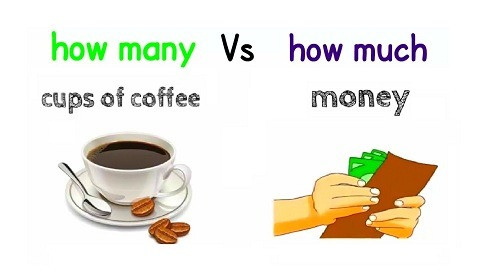
Note: In affirmative sentences, many is not used much, instead we use a lot of.
– Much is synonymous with many but has a different usage:
+ Used with uncountable singular nouns.
For example:
- Is there much sugar left?
+ Used in questions and negative sentences.
For example:
-
We didn't eat much meat.
- How much time do we have to leave?
+ Does not often appear in affirmative sentences, unless it is a formal sentence.
For example:
- There is much concern about the lifestyle of young people.
+ Used in affirmative sentences if the sentence contains the following words: very, too, so, as, how.
For example:
- He drank so much wine at the party.
2.6. A bit
A bit (of), bits (of) means a little, a little; Used for concrete and abstract things or used to reduce or avoid sentences. They are often used in casual, informal sentences. In important sentences we often use some, a piece of, pieces of instead.
For example:
-
They asked for bits of help with their problem.
- It's just a bit of a problem. You don't need to mind.
2.7. All
Meaning all, all is used for both countable and uncountable nouns.
For example:
- All information about this case is confidential.
+ All is used before the article the, possessive adjectives (my, his, her), demonstrative pronouns (this, those) and numbers.
For example:
- All these students passed the exam.
+ All goes with the preposition of when it comes before a relative pronoun (whom, which) or an object pronoun (him, her, us).
For example:
- I love all of you.
+ All of is often used before possessive adjectives, the article the and demonstrative pronouns, but is not required, the preposition of can be omitted.
For example:
- All (of) my students are very naughty.
+ When referring to an entire thing or person (in general), the quantifier all goes with the noun, not with the or of.
For example:
- All mothers love their children.
2.8. None
+ No can come before singular and plural countable nouns or uncountable nouns.
For example:
- We got no time.
+ None acts as a pronoun, used as subject and object. None stands alone and replaces countable and uncountable nouns.
For example:
- He has 2 best friends, but none came to attend his wedding.
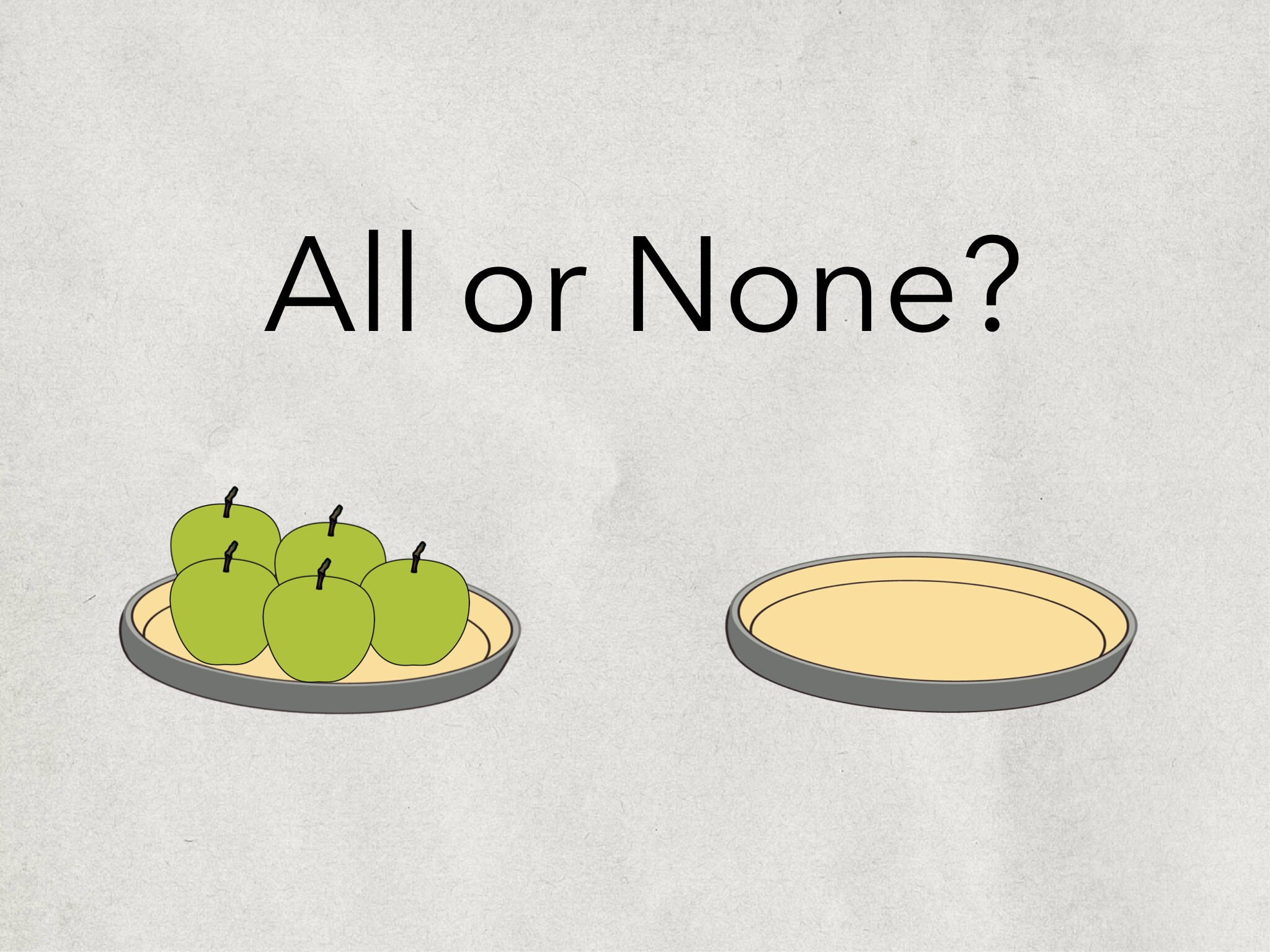
+ When None is the subject, the verb is conjugated according to the word it represents.
For example:
- I’m always looking for ideas. None ever come.
+ None is commonly used with prepositions in English. of when it comes before the article the, object personal pronoun (him, it), demonstrative pronoun (this/that), or possessive adjective (my, your).
For example:
- None of the students know what happened to their teacher.
+ None is not used in sentences that contain negative words like not.
2.9. Enough
One Quantity words in English The difference that few people expect is Enough, enough structure Used before countable and uncountable nouns.
For example:
- I never have enough money to buy this house.
+ Used in both affirmative, negative and interrogative sentences.
For example:
- She has enough time to watch that movie.
+ Enough comes with the preposition of when it precedes the article the, demonstrative pronouns (this/that), possessive adjectives (my, his, their) or object personal pronouns (him, her, us ).
For example:
- I have enough of you.
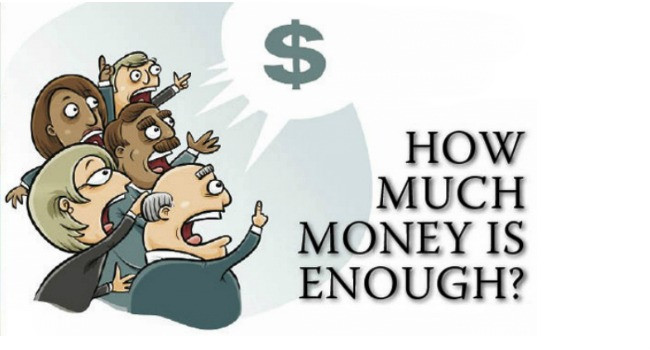
2.10. Less
Means less, less is a quantifier used with uncountable singular nouns.
For example:
- You have less chance when competing with him.
Less comes with prepositions of when it comes before an article (a/an, the), a demonstrative pronoun (this/that), a possessive adjective (my, his, their) or a personal object pronoun (him, her, us).
For example:
- I meet less of him since he moved away.

